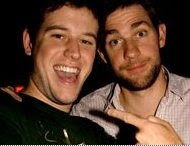 Wendy and Lucy
Wendy and LucyDirected by Kelly Reichardt
Starring Michelle Williams
80 minutes
Review by Scott Johnson
It is always a pleasure to watch an actor transform into a character and embody a completely different persona. This does not need to be over stated, like pretending to be a larger than life figure, and is often better when it is not. Take Mickey Rourke, for example, in The Wrestler--he simply lives in the skin of an entirely different character, utterly believable not just because he hits all of the emotional notes correctly but because he inhabits Randy "The Ram" Robinson's skin with completely convincing authenticity. Sean Penn succeeds similarly in Milk. Frank Langella as Nixon, on the other hand, performs quite well but we are always aware that this is a guy trying to act like Nixon.
Michelle Williams' performance in Wendy and Lucy fits into the naturalistic mold of Rourke and Penn. Her performance does not reach the heights of the other two, but there was never a moment that I thought of her as anything but Wendy, the young woman who lives out of her car in a small town. There are a lot of young people like her where I live in the Bay Area, especially in Berkeley, and if I saw her walking down the street on Telegraph Avenue with a bunch of homeless street kids I wouldn't think twice about whether she belonged.
Williams as Wendy is temporarily homeless and on her way to Alaska. If you saw Into the Wild--or even just paid attention to the presidential campaign late last year--hearing this will probably send shivers down your spine. But that is not what this film is about. Wendy is simply down on her luck, broke, and stuck in a small town with a broken down car and a dog to take care of.
It is hard to say much about the plot without giving anything away--although there are not exactly huge spoilers in the movie--because the story develops slowly and meticulously. The time is often passed with long, contemplative shots as Wendy makes her way from one difficulty to the next. I suspect that the director thought this would make the film feel "artsy," but there is not a lot to contemplate along the way. The key to the movie is Williams herself, who is not only convincing be very likable--it is hard not to care about her and hope that she succeeds. And she faces real challenges--not boyfriend problems, or gossipy drama at her high-income job in Manhattan, but the sort of challenges broke young women face. More of her in the time allotted would have made the film much more enjoyable, although I think it succeeds based on Williams' performance alone.
It is really a shame that the economics of filmmaking require that most movies be roughly 90 to 120 minutes. Read any screenwriting book and they will all tell you that scripts should be roughly 90 to 120 pages, assuming 1 page per minute on average. There are obvious exceptions to this--the occasional 3 hour movie, but all those shoot for greatness, usually on an epic scale, sometimes successfully (The Godfather, Reds) sometimes not (Che, The Curious Case of Benjamin Button).
The reason for this is that successful movies hope to make it onto television, and a movie over 2 hours can easily last 3 hours on TV with commercials, which is far too long (presumably) for today's short attention span audience. Even worse, longer movies can be shown fewer times through the day, occupying valuable screen real estate. When I saw the 4 hour Che, for example, the price was $15 instead of the usual $10 so that the theater could make up some of its lost revenue.
The converse, of course, is also true--moviegoers would feel cheated paying $10 for a movie that is less than one hour. I cannot say for sure, but I imagine that the film festival circuit, which is looking for the next big indy "hit," probably looks down on shorter films as well. I have never really understood why big studios looking for a cheap buck never take a few short films or even two one hour films and distribute them in a single package, made on the cheap by indy directors looking to break in. Is there no audience for this? It could be done maybe a few times a year and billed as a mini-film festival and at least distributed to the art house and independent thaters. Hollywood once distributed double features, with one of the films being as short as an hour long, although this was before the prominence of television, but personally I would love to see this.
Unfortunately, without this, a film like Wendy and Lucy is forced to stretch itself into a running time long enough to be taken seriously. At 80 minutes, it is flirting with the lower bounds of acceptable running times--I imagine the filmmakers thought that 78 or 79 minutes was just too short and they made sure that it at least hit 80 and then stopped stretching. Even though it was enjoyable, a slightly shorter film--perhaps one hour long--could have been a real classic.





No comments:
Post a Comment